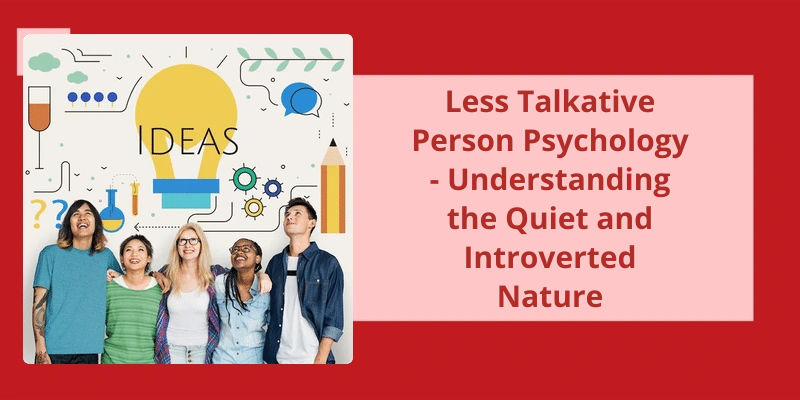In a world that often rewards extroverted personalities and encourages constant communication, it can be easy to overlook the quieter individuals among us. However, those who identify as less talkative often possess a unique perspective and approach to life that’s worth exploring. From a psychological standpoint, these individuals may have a heightened capacity for observation, creativity, and introspection. While some may wrongly assume that they’re uninterested or unfriendly, it's important to understand that their quieter demeanor is often simply a result of a natural inclination towards deep thinking and reflection. Understanding the psychology of the less talkative individual can shed light on the value they bring to our communities and the world at large.
Are Some People Not Talkative?
It’s important to understand that being talkative isn’t the ultimate benchmark of intelligence or social competence. It’s okay to be quiet and introverted. Some people are naturally more reserved and prefer to observe and listen before speaking up. They may have a rich inner world and prefer to reflect before expressing their thoughts. This doesn’t mean they aren’t interested in what’s happening around them or that they don’t have valuable contributions to make. Their silence shouldn’t be mistaken for ignorance or indifference.
Some people may be hesitant to speak up because of social anxiety or shyness. They may fear being judged or rejected by others and feel more comfortable staying in the background. This can be a real struggle for them, and it’s important to create a safe and welcoming environment where they can feel more comfortable expressing themselves. It’s important to be patient and understanding with such individuals and encourage them to share their thoughts and feelings.
Cultural and linguistic differences can also play a role in how talkative people are. In some cultures, it’s considered rude or impolite to speak too much or dominate a conversation. Individuals from such backgrounds may be more reserved and allow others to take the lead in communication. Similarly, someone who isn’t fluent in a language may be hesitant to speak up for fear of making mistakes or being misunderstood.
Personal preferences and interests can also influence how talkative someone is. Someone who’s very interested in a particular topic or activity may become more animated and enthusiastic when discussing it. On the other hand, they may be less interested in other things and not have much to say about them. It’s important not to judge or label someone based on their talkativeness, but to try to understand what motivates them and what they’re passionate about.
Talkativeness isn’t a one-size-fits-all trait. Some people are naturally more talkative than others, and there may be various factors that contribute to how much someone talks. It’s important to respect and appreciate each individuals unique communication style and not jump to conclusions or make assumptions. By being open-minded and patient, we can create a more inclusive and welcoming environment for everyone.
As much as society values social skills, it’s important to acknowledge that not everyone is wired to be a social butterfly. In fact, some may thrive more in solitude or in quieter environments where they can fully concentrate and recharge. However, it’s important to strike a balance between being less talkative and still being able to interact with others when necessary. Let’s delve deeper into this topic and see if being less talkative is really okay.
Is It OK to Be Less Talkative?
If we talk about social scenarios, being less talkative can sometimes make it difficult for others to engage with you and build relationships. People often judge us based on how we behave during social events. Often, a lack of involvement in conversations or no initiation from your side can result in misunderstandings and awkwardness. It can sometimes cause people to think that you’re uninterested or unapproachable. While it may not be your intention to come across as distant, your introverted behavior may be perceived as such. This is why it’s critical to balance your need for solitude with social interaction.
On the other hand, being less talkative can be beneficial in certain situations. It’s essential to be a good listener, which is a critical social skill. Listening to another person requires both empathy and silence, as it allows the other person to express themselves. In more professional settings, being quiet and reserved can be perceived as a sign of maturity and professionalism. It’s also essential to have clarity of thought and be able to express yourself concisely.
It’s crucial to understand that being less talkative isn’t synonymous with being shy or introverted. It’s a personal characteristic that can influence how you interact with others. Some people are naturally quiet, while others enjoy being involved in social activities. However, it’s essential to know the difference between someone who’s reserved and someone who isn’t interested in interacting with others.
It’s essential to find a balance between being talkative and being quiet. It’s critical to understand your own personality, strengths, and limitations to manage your interactions with others successfully. Introverted individuals can find it beneficial to engage in activities that give them alone time, such as taking walks, reading books, or practicing yoga. It’s also essential to push oneself out of their comfort zone. By doing so, you may find that you enjoy social events more than you thought, and it can help build stronger relationships.
It’s perfectly acceptable to be less talkative in certain situations. However, it’s crucial to maintain social interactions, build relationships, and develop critical social skills. So, it’s essential to find your sweet spot to make the most of your unique personality.
Tips for Introverted Individuals to Thrive in Extroverted Social Settings
This article provides tips for introverted individuals on how to feel comfortable and thrive in social settings that are predominantly extroverted.
Source: Is being a less talkative person a positive on the job or …
Understanding the psychology behind talking habits can help shed light on why some people may be more talkative than others. One’s personality traits and characteristics, such as being extroverted or introverted, can play a significant role in how much they talk and how they express their thoughts and ideas. Let’s delve deeper into what psychology has to say about talkative individuals and how it affects their communication style.
What Does Psychology Say About Talkative Person?
However, excessive talking can also be a sign of underlying mental health conditions such as bipolar disorder, ADHD, or anxiety. In some cases, individuals may be using excessive talking as a coping mechanism to deal with their emotions or to distract themselves from uncomfortable situations.
From a psychological standpoint, excessive talking can also affect relationships. It can be overwhelming for others to engage in a conversation with someone who dominates the conversation and doesn’t allow others to have a chance to speak. This can lead to feelings of frustration and resentment in the other person, which can damage the relationship.
In therapy, excessive talking can also be a challenge for the therapist. It can also prevent the therapist from fully understanding and addressing the individuals concerns.
While it may provide a sense of comfort or distraction for some, it can also create tension and miscommunication in relationships. It’s important for individuals to be aware of their excessive talking and to seek support if it’s becoming problematic.
However, there are other psychological factors that can contribute to over-talking, including narcissism, impulsivity, and attention-seeking behavior. Understanding the root causes of over-talking can help individuals identify the problem and develop effective strategies to manage their communication habits.
What Are Psychological Reasons for Talking Too Much?
This behaviour can stem from a desire to fit in and be accepted by others, as well as a fear of being judged or rejected. Those who talk too much may also be seeking validation and attention from others. Subconsciously, they may believe that by dominating the conversation, they’ll be seen as interesting or knowledgeable.
Some individuals who talk excessively may also have underlying mental health conditions, such as ADHD or bipolar disorder, that can cause them to become hyperactive and talkative. In some cases, over-talking can also be a symptom of mania or hypomania, particularly in individuals with bipolar disorder.
They may not realize that they’re dominating the conversation or that others are becoming disinterested or annoyed with them. This lack of awareness can stem from a variety of factors, including a lack of socialization, cultural differences, or a neurological disorder such as Asperger’s syndrome.
Overall, over-talking can have several complex psychological causes, and addressing the underlying issues often requires a multifaceted approach. This may include therapy, behavioural coaching, and developing better communication skills. By understanding the root causes of over-talking, individuals can begin to take steps towards breaking the cycle and developing more balanced social interactions. It’s important to seek professional help if over-talking is affecting your ability to form healthy relationships or is causing significant distress.
When it comes to personality traits, there are many that distinguish one person from the next. One such trait is being taciturn, which refers to someone who’s reserved and not particularly talkative. This can manifest in various ways, from seeming unapproachable to just being naturally introverted. Let’s take a closer look at what it means to be taciturn and how it can affect one’s interactions with others.
What Do You Call a Person Who Is Not So Talkative?
Many people often describe themselves as either an introvert or an extrovert. However, theres another classification for someone who isn’t so talkative, and that’s being taciturn.
Taciturn individuals are known to be tight-lipped and are usually not inclined to engage in long conversations. They tend to speak less and listen more while keeping their opinions to themselves. Being taciturn doesn’t necessarily mean the person lacks communication skills. Rather, they prefer to observe and analyze before engaging in a conversation.
Being a taciturn person can have it’s perks. For instance, it allows the individual to be more pensive and thoughtful, which can lead to intellectual and creative advantages. Furthermore, taciturn individuals are usually more focused, making them productive and efficient in their tasks.
On the other hand, being known as a taciturn person may impact the individuals social life. People may perceive them differently and judge their silence as snobbish or rude. Eventually, they may struggle to make new connections as someone whos not talkative may come off as unapproachable or disinterested.
It’s important to note that being taciturn doesn’t have to be seen as a weakness or a strength. It’s just an individuals preference on how they choose to express themselves. Nonetheless, if it becomes a hindrance to ones daily life or relationships, then seeking professional help or engaging in positive and productive social activities can help overcome it.
How to Overcome Being a Taciturn Person
Being a taciturn person means that you tend to be quiet and reserved. To overcome this, one can start by actively engaging in conversations and speaking up when they’ve something to say. It can also be helpful to practice active listening and asking open-ended questions to keep the conversation going. Another approach is to challenge oneself to step out of their comfort zone and attend social events or activities. With practice and patience, one can become more comfortable in social situations and overcome being a taciturn person.
Conclusion
In conclusion, the psychology of less talkative individuals is a complex and often overlooked aspect of human behavior. Quiet individuals possess a unique set of characteristics that often go unrecognized by others. They’re natural learners who possess an insatiable curiosity and an unquenchable thirst for knowledge. Their preference for internalizing thoughts and ideas doesn’t imply that they’re anti-social or disinterested in social connections. Instead, they prioritize expanding their minds over opening their mouths, and this approach to life should be celebrated and appreciated. It’s important to recognize and honor the strengths of all personality types to promote a more inclusive and understanding society.






